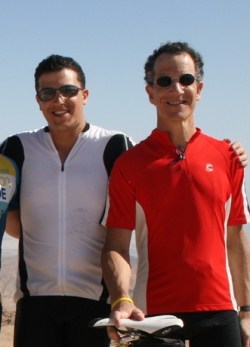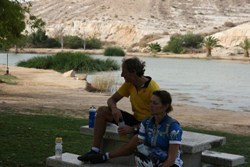by Misha Zinkow, Israel Rider, November 2010
On October 25, after bicycling from Jerusalem some 300 miles into the Negev and Sinai Deserts, 120 Hazon riders were rewarded with a stunning descent into Eilat, Israel’s southernmost point.
Although the ride, the preparatory day and debriefing day spanned only 8 days, my journey in Israel included three Torah portions, Lech-lecha, Vayera and Chaye Sarah, and each parsha offered me a gift and an insight for the ride. Lech-lecha is the story of God’s challenge to Abraham to leave his hometown in Mesopotamia, embrace the radical theological notion that God is one, and to take that message west, all the way to the shores of the Mediterranean. The Torah portion begins with the words “Lech-lecha,” an unusual alliterative phraseology. Lech-lecha cannot be simply translated as “go,” for that would require just one word, “lech.” The second word that is connected to “lech” is “lecha,” which means “toward you,” or “for you.” The greatest biblical commentator Rashi understood the construct to mean, “Abraham, you need to leave this place, you need to go, for your own good, go, for your own benefit, go, on a journey, into yourself for your own growth.” What a magnificent metaphor for an unorthodox immersion into Israel that would involve a close encounter with an Israel people rarely come into contact with when on a standard tour. To bicycle the roads of Israel under the Mideast sun at 15-20 miles an hour is to experience not only the land, but also oneself in the harsh conditions of the desert. I arrived in Israel on the Friday of Parshat Lech-lecha, and although my trip was for the express purpose of raising money for peace and environmental protection, it was I who would benefit very deeply from the experience. I went “lecha,” into myself while spending many hours each day in solitude on a road bike. Most of the day, all I heard was the sound of the bike’s front tire on the road and my own breathing, a blend of man and machine that produced tranquility unmatched in my previous experience on a bike. Gazing out over the desert from the saddle of a bicycle, passing numerable Bedouin encampments, one can almost see our own ancestors’ journeys from Haran to Beer Sheva and from Egypt to the mountains of Moab. I was reminded on many occasions that the ancient connection between this land, so barren, so dry as it is, and our people, so determined, so gritty cannot be broken.
offered me a gift and an insight for the ride. Lech-lecha is the story of God’s challenge to Abraham to leave his hometown in Mesopotamia, embrace the radical theological notion that God is one, and to take that message west, all the way to the shores of the Mediterranean. The Torah portion begins with the words “Lech-lecha,” an unusual alliterative phraseology. Lech-lecha cannot be simply translated as “go,” for that would require just one word, “lech.” The second word that is connected to “lech” is “lecha,” which means “toward you,” or “for you.” The greatest biblical commentator Rashi understood the construct to mean, “Abraham, you need to leave this place, you need to go, for your own good, go, for your own benefit, go, on a journey, into yourself for your own growth.” What a magnificent metaphor for an unorthodox immersion into Israel that would involve a close encounter with an Israel people rarely come into contact with when on a standard tour. To bicycle the roads of Israel under the Mideast sun at 15-20 miles an hour is to experience not only the land, but also oneself in the harsh conditions of the desert. I arrived in Israel on the Friday of Parshat Lech-lecha, and although my trip was for the express purpose of raising money for peace and environmental protection, it was I who would benefit very deeply from the experience. I went “lecha,” into myself while spending many hours each day in solitude on a road bike. Most of the day, all I heard was the sound of the bike’s front tire on the road and my own breathing, a blend of man and machine that produced tranquility unmatched in my previous experience on a bike. Gazing out over the desert from the saddle of a bicycle, passing numerable Bedouin encampments, one can almost see our own ancestors’ journeys from Haran to Beer Sheva and from Egypt to the mountains of Moab. I was reminded on many occasions that the ancient connection between this land, so barren, so dry as it is, and our people, so determined, so gritty cannot be broken.
On the second day of the ride, we came upon a place that is a version of and a pla y on the name Tel Aviv, which essentially means old-new (a tel is a deep archeological mound. An aviv is a spring). Our version is Golda Park, named for Golda Meir, one of Israel’s prime ministers. But the park, in the middle of the desert, a real oasis that has been adapted and sculpted with modern hands, is as old as the Bible. This place, known biblically as Be’er Roi, Shepherd’s Well, has an ancient large fresh water pool. According to the story in the Torah portion of that very week we were riding, Vayera, this is the life-saving body of water that God provided for Abraham’s maidservant Hagar when Sarah threw her and Ishmael out of the house. I’ve been to Israel on many trips, and I had never been here. But here we were, with a layer of the day’s sand on our faces, sitting at an ancient spring that God provided to save the branch of Ishmael, today considered the ancestors of the Arab people. As we sat upon the lush lawn under the trees that are nourished by the underground spring, it certainly gave me pause to remember that all of the people on our earth are connected, and that all of the people on this planet are the children of the living God, who loves and protects us all.
y on the name Tel Aviv, which essentially means old-new (a tel is a deep archeological mound. An aviv is a spring). Our version is Golda Park, named for Golda Meir, one of Israel’s prime ministers. But the park, in the middle of the desert, a real oasis that has been adapted and sculpted with modern hands, is as old as the Bible. This place, known biblically as Be’er Roi, Shepherd’s Well, has an ancient large fresh water pool. According to the story in the Torah portion of that very week we were riding, Vayera, this is the life-saving body of water that God provided for Abraham’s maidservant Hagar when Sarah threw her and Ishmael out of the house. I’ve been to Israel on many trips, and I had never been here. But here we were, with a layer of the day’s sand on our faces, sitting at an ancient spring that God provided to save the branch of Ishmael, today considered the ancestors of the Arab people. As we sat upon the lush lawn under the trees that are nourished by the underground spring, it certainly gave me pause to remember that all of the people on our earth are connected, and that all of the people on this planet are the children of the living God, who loves and protects us all.
We then rode along the fenced Egyptian border toward the Red Sea, a long, barren landscape, with no water in sight. The third parsha of the trip, Chaye Sarah, describes Eliezer’s (Abraham’s s ervant) search for a wife for Isaac following Sarah’s death. The woman he finds is Rebekah, who agrees to go with him to marry Isaac. The text tells us, “Raising her eyes, Rebekah saw Isaac.” Rebekah falls immediately in love with Isaac, and hurries to bring him water and to water his camels. In doing so, she completes the servant’s hope that a marriageable woman will also be one so very generous and kind to him and to Isaac. The water she carries signals her capacity to be life-giving and healing. Water it is a symbol that plays a role in all three Torah portions that spanned this trip, and it plays a critical role, not as symbol, but as a true revitalizing and restorative resource, each and every day in Israel. I cannot measure how much water I drank during this ride, but I was on a bike several hours a day in 90-100 degree temperatures, as were 120 other riders and a support staff of a couple dozen young Arava Institute alumni. You can try to do the math.
ervant) search for a wife for Isaac following Sarah’s death. The woman he finds is Rebekah, who agrees to go with him to marry Isaac. The text tells us, “Raising her eyes, Rebekah saw Isaac.” Rebekah falls immediately in love with Isaac, and hurries to bring him water and to water his camels. In doing so, she completes the servant’s hope that a marriageable woman will also be one so very generous and kind to him and to Isaac. The water she carries signals her capacity to be life-giving and healing. Water it is a symbol that plays a role in all three Torah portions that spanned this trip, and it plays a critical role, not as symbol, but as a true revitalizing and restorative resource, each and every day in Israel. I cannot measure how much water I drank during this ride, but I was on a bike several hours a day in 90-100 degree temperatures, as were 120 other riders and a support staff of a couple dozen young Arava Institute alumni. You can try to do the math.
The truth is, while our newspapers cover stories about a settlement freeze and the frozen state of the peace talks, the reality behind the headlines is that thinking and progressive Israelis and Palestinians want peace more than anything else. Those same thoughtful people are the ones who are working together to address what is one among many shared challenges, but probably the most critical, and that is finding solutions to the question: from where will the water come that will be needed to sustain the very people who want to co-exist? Access to sustainable sources of clean water is one of the keys to the stability of the region.
While the miraculous Be’er Ro’i provided life for Hagar in her hour of despair, no one expects such miracles to re-occur. Both Abrahamic peoples will need to respectfully think and plan together to create a land that will get greener and greener, and to prevent the desert from encroaching upon what precious little habitable land exists.
I was blessed to have this opportunity to encounter Israel while riding on the saddle of a bike. I would do it again in a minute, and I will reiterate my fervent desire that every one of you make it a point to see Eretz Yisrael in any way you can. The Land of the Bible, the land described in our Torah, is the same land you can peacefully traverse alone, with friends or with a family – by car, by foot, by bus, or by bike.
~~Rabbi Misha Zinkow
I want to acknowledge and express appreciation to those among you who generously contributed to Hazon and the Arava Institute for Environmental Studies through your support of my participation on the ride. I can offer you hamon todot, many many thanks on behalf of those two wonderful organizations!




No comments yet.